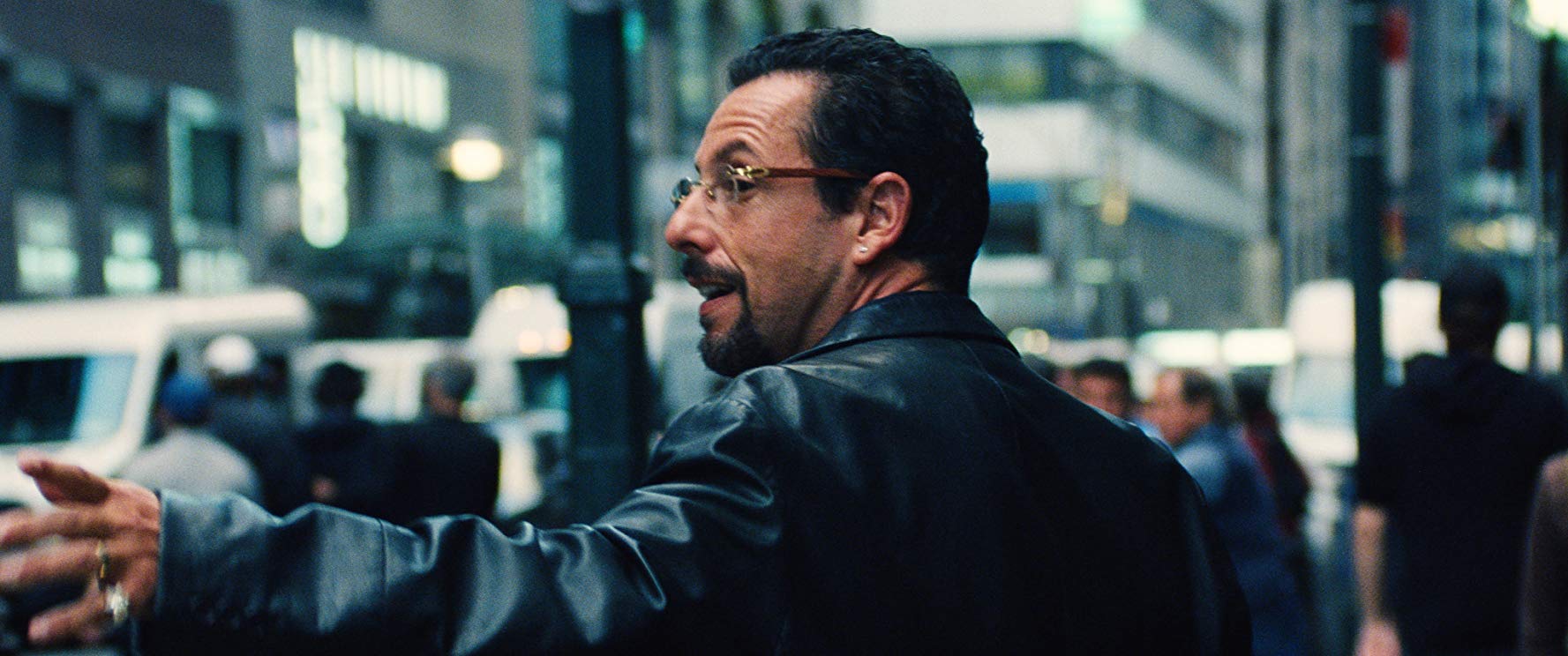The Safdie brothers are back and more chaotic than ever. Their previous film Good Time, a crime thriller about a scumbag’s tenacious quest for wealth, brought them acclaim and mainstream attention—so, with their hotly anticipated follow-up Uncut Gems, they’re swinging for the conceptual fences: it’s a crime thriller about a scumbag’s tenacious quest for wealth. If it ain’t broke…
Improve it! Good Time was an intoxicating concoction, but it wasn’t without shortfalls. Although money is the protagonist’s main goal, his short-term goals are in constant flux, as the situations he confronts are changed drastically by wacky twists. This plays at odds with the movie’s ramping tension—as the stakes heighten, the narrative keeps resetting the protagonist’s short-term goal, turning what could’ve been a 90-minute nail-biter into smaller vignettes of contained stress.
Uncut Gems fixes this problem through two structural gambits: one, it lets the story settle into natural periods of downtime, erasing the objective that every moment need be more tense than the last; two, it ensures that even when the protagonist’s short-term goals change, his road to victory is always centered around a single object—a priceless gem. This lends a sense of connectedness to the Safdies’ stressful vignettes, cohering wacky set pieces into a kaleidoscope of tunnel vision.
Review: ‘Knives Out’ is one of the best big studio movies of the year
Review of ‘Star Wars: The Rise of Skywalker’
Good Time’s other shortcoming fell with its central duo. The scumbag protagonist was defined by his scumbaggery, and his mentally challenged brother was the sole source of pathos. This worked wonders when the duo was together, but when the protagonist was off on his own, the absence of pathos sanitized the movie into a chain of unfeeling consequences. These consequences were earned, but they failed to generate emotion until their impact on the protagonist’s brother was revealed. Uncut Gems solves this by merging scumbaggery and pathos into one character: Howard Ratner, a man with the greed of a venture capitalist and earnest naiveté of a mentally disabled person.
Howard is also Adam Sandler, giving a great performance for the first time in a few years (again). His work in Uncut Gems may not be some extraordinary reversal of his laurel resting, but it’s a recalibration of what makes Sandler a good entertainer: go-for-broke brashness, revels in suppressed male impotence, and an almost inadvisable level of commitment to each bit. The cracks in this all-out approach still show, but layered onto the Safdies’ all-out approach to practically everything, it fits right in. Sandler goes so big with his clashing traits that it’s possible to root for and against him simultaneously.
Uncut Gems is quite a ride when it’s making this cognitive dissonance—exemplified by a tonally dissonant score—fun. The Safdie brothers have mined the ore of mean-spiritedness and struck the gold of how to make it a blast: maintain so much tension that a scumbag’s peace of mind would feel like catharsis. Uncut Gems sustains tension by turning up the volume on everything—the unfiltered noise pollution of multiple conversations, unmasked emotional outbursts of a flailing family, unhindered confidence of powerful people. The film takes to extremity like a pig to filth, rolling around in excess to the point where we’re hoping for a conclusion excessive enough to end it all. On that front, the Safdies deliver.
The finer details aren’t as cogent in all the maximalism. Uncut Gems has political targets in its sight (chiefly capitalism and imperialism), but the movie’s rigid roller coaster structure makes messaging feel out of place. Thank god the architecture is sound, lest our car fly off the tracks into exhaustion or boredom, but I was too busy loop-de-looping to remember the coaster’s theme. When the movie slows for moments of clearheaded politics—like during a prologue that amplifies the suffering of third-world workers—it slows too briefly, and its sermons are drowned out by the stress-inducing structure kicking back in. Uncut Gems doesn’t paint the systems and traditions of its characters in broad strokes, but broad strokes may be all you remember after the (expertly-crafted) anxiety attack is over.
★★★★ (4/5)




